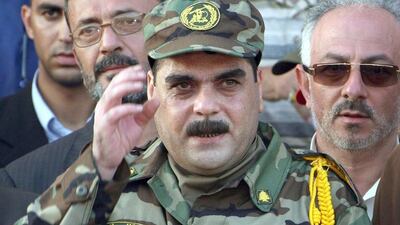Beirut // A notorious Lebanese militant who spent nearly 30 years in an Israeli prison has been killed from an Israeli airstrike on a Damascus suburb.
Samir Kuntar, 53, who was convicted of the 1979 murder of a father and his four-year-old daughter on an Israeli beach before going on to become a senior Hizbollah commander, died inside a residential building when it was attacked on Saturday, the militant group’s TV station Al Manar said. Israeli warplanes hit the building in Jaramana with four missiles at about 10.15pm, Hizbollah said.
The airstrike showed Israel’s continued commitment to go to great lengths to eliminate its enemies and a willingness to go it alone in bombing pro-government targets in Syria.
Syria’s state-run Syrian Arab News Agency did not point the finger directly at Israel, saying instead that Kuntar had been killed in a “hostile terrorist rocket strike.”
Late on Sunday, three rockets were fired into Israel from southern Lebanon, where Hizbollah is dominant, security sources on both sides of the border said. Israel retaliated with artillery fire.
While Israel did not confirm its involvement, Kuntar’s death was welcomed by Israeli officials.
“He was an arch-terrorist who killed a young girl by fracturing her skull and had continued his terrorist activities after being freed,” said Israeli justice minister Ayelet Shaked. “It’s a good thing he met his maker.”
When Kuntar was 16, he joined Palestinian Liberation Front militants on a raid in April 1979 that took them by boat from the southern Lebanese city of Tyre to the northern Israeli city of Nahiriya.
After killing a policeman, the group entered an apartment building where they took a man and his four-year-old daughter hostage. Kuntar marched the pair to the beach where the group’s dinghy had landed before executing them. He shot the father in the back and, according to Israel, smashed the young girl’s head on rocks, killing her.
Kuntar disputes the Israeli version of events, claiming she was killed in crossfire.
The girl’s sister suffocated as her mother tried to keep the two-year-old from making noise and revealing their hiding spot during the kidnapping of her husband and other daughter.
On Sunday, Al Manar wrote that Kuntar’s attack was a “heroic operation against Zionists.”
Captured immediately after the killings, Kuntar spent the next 29 years jailed in Israel before he was freed in a swap deal with Hizbollah in 2008. Kuntar was among five Lebanese prisoners Israel traded for the bodies of two Israeli soldiers whose July 2006 abductions sparked a 34-day war between Israel and Hizbollah.
The release of Kuntar and other prisoners was declared a national holiday in Lebanon and the group was greeted by the country’s president and prime minister. Photos of the celebrations after the release showed a jubilant Kuntar, a Druze, wearing a camouflage outfit with a Hizbollah scarf around his shoulders standing alongside Hizbollah leader Hassan Nasrallah.
Since his release, Kuntar is believed to have become increasingly important to Hizbollah.
Over the course of Syria’s civil war, Israel has not shied away from using its air force to hit Hizbollah and Syrian government targets inside Syria, where Hizbollah has been backing the Syrian government in the civil war.
The most notable strike came in January when Israeli warplanes killed the son of former Hizbollah military commander Imad Mughniyeh, an Iranian general and a number of Hizbollah fighters in the Golan Heights. Hizbollah responded ten days later by targeting an Israeli military convoy across the border with anti-tank missiles, killing two. Israel responded by firing more than 50 artillery shells at southern Lebanon.
Al Manar’s Israeli affairs editor Hasan Hijazi said Israel was avoiding confirming the strike on Kuntar to avoid “a harsh retaliation by the resistance” according to the station.
Hizbollah has promised retaliation for Israeli attacks in the past, but the group has seen its abilities and ranks stretched as thousands of fighters have been moved into Syria to back the government of Bashar Al Assad.
Many other Hizbollah fighters are active along Lebanon’s border with Syria fighting against Jabhat Al Nusra and ISIL. At this point, starting a conflict with Israel would mean opening a third front and, despite the harsh rhetoric, the group has been seen as keen to avoid war.
Still, as the clashes in January showed, when Hizbollah feels it needs to, it will attack Israel despite the increasing disadvantages the war in Syria has weighed on it.
The latest strike comes at a time when the airspace over Syria is crowded with fighter jets of foreign countries. The US-led anti-ISIL coalition has focused its attacks on extremists in the east of the country in ISIL-held territory and since intervening on behalf of the Syrian government on September 30, Russia has targeted rebels and extremists. Israel’s is the only air force that has been seen as intentionally targeting pro-government forces.
Israel’s defence minister has said that Russia and Israel have worked out an open communication system “to prevent misunderstandings.”
On November 24, a Turkish F-16 downed a Russian Su-24 after it briefly entered Turkish airspace from northern Syria. Since then, Russia has taken an even more aggressive footing in Syria, installing sophisticated anti-aircraft missile systems to protect against aircraft deemed hostile. Russia has also maintained contact with the US-led coalition and Israel about air activities to avoid misunderstandings, potential confrontations and accidents.
It is unclear whether Israel coordinated their strike with the Russians. Russian consent would be a slight to their allies the Syrian government. But for Israel to go in without permission would risk one of their aircraft being shot down by the Russians and a dangerous diplomatic incident.
foreign.desk@thenational.ae
*With agencies

